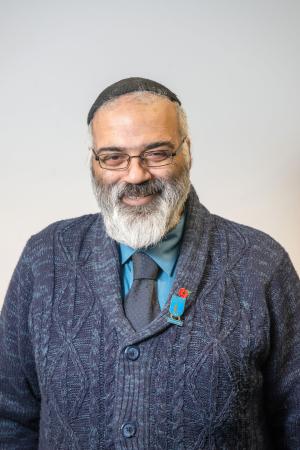
David Isaac is not a man to stand on the sidelines. He believes passionately: "If you don't get involved, you have to accept what you're given." So he said a heartfelt yes when he was invited to join the Hammersmith & Fulham Disabled People's Commission in 2016.
Hammersmith & Fulham Council set the commission up with the aim of giving Disabled people in the borough a bigger say in how services are designed and delivered.
It has already surveyed the views of Disabled people in the area and has held an open meeting to encourage more people to get involved.
David, who's 52, lost his sight five years ago, which put an abrupt end to his 20 year career as a graphic designer. He found out fast how patchy services and support for Disabled people can be.
It was only when he attended a sight loss course run by the Royal National Institute of Blind People that he appreciated he was getting a comparatively good service in Hammersmith & Fulham: "There were 20 of us from all over London, and I realised I was getting more help than anyone else in the room. I hadn't thought it was anything special, but everyone else there was getting a much poorer service."
He and his Disabled colleagues on the commission, chaired by disability activist and Hammersmith resident Tara Flood, believe local services could be much better.
The commission aims to create a genuine partnership between those providing services and those using them, a concept described as coproduction. The 2014 Care Act established coproduction as the way local authorities should now be working, but David says it is hard to find an effective model anywhere.
"Change has to happen from top to bottom, from the policymakers and the managers right down to the frontline staff," he says.
He wants to see a change in attitudes and a shift in culture so services are no longer designed or delivered without working closely with Disabled people. David puts it forcefully: "Even with the best intentions, people are making decisions for Disabled people, not with them. And that causes more harm than good."
The commission has adopted the disability activist slogan "Nothing about us without us" to promote its open meetings.
It's looking to Hammersmith & Fulham to build its services around the social model of disability, focusing on the barriers society puts in the way of Disabled people rather than on what an individual can or can't do.
It's something David experiences every day – even small changes can make a big difference if they aren't thought through properly.
He gives a recent example. He knows the borough well and walks everywhere with his guide dog Scooby, but he found himself right in the middle of Hammersmith Grove because work had just been done to level the pavement with the road, without putting in tactile paving to mark the pavement edge (it's now been put in since David pointed out the problem).
He knows it is hard to make changes at a time when local government and charities are having to make cuts. He understands how council staff can get stuck in procedures, protocol and government legislation.
But his volunteer work at Bishop Creighton House, with AgeUK and with Guide Dogs, constantly reminds him just how despondent people can become when they don't get the right support.
He struggled himself to adapt from his independent life to having to rely on others, and credits his two teenage daughters with keeping him going. "I can't be my family's breadwinner anymore, but I still want to be a good role model for them," he said, "I have to be the man who tries."
He's impatient for the commission to have an impact before it reports back later this year. "We're a small group and we can't fight individual cases. But we want to make a difference, and provide a structure so we see some real changes."